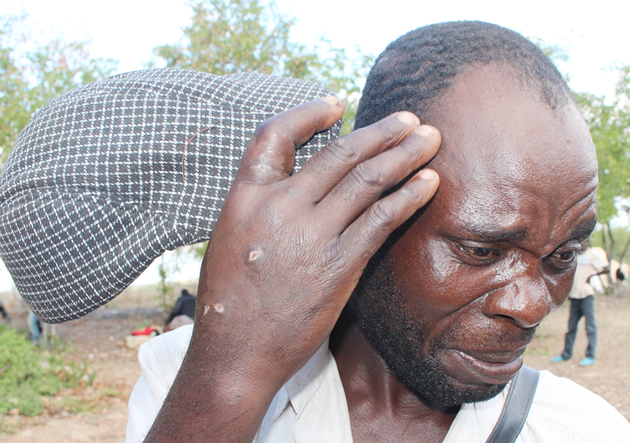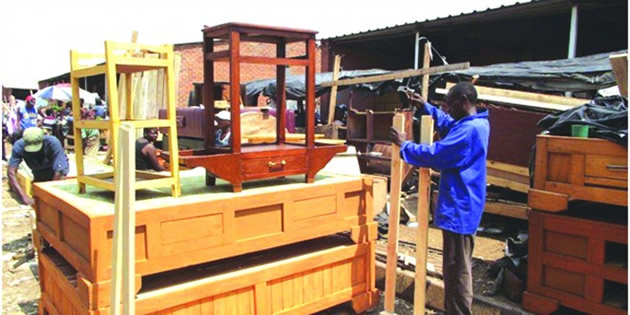Tormented Zimbabweans counselled

From Mashudu Netsianda in Beitbridge
MORE than 100 tormented Zimbabweans who fled xenophobic attacks in Durban, South Africa, yesterday went through trauma counselling sessions at the International Organisation for Migration (IOM) reception and support centre in Beitbridge.
Dorcas Sithole, the deputy director for Mental Health Services in the Ministry of Health and Child Care told The Chronicle that it was necessary for the victims to undergo counselling to relieve stress following their horrific experiences during the violent attacks in South Africa.
One of the victims, Manuel Venge, 38, from Chivi district in Masvingo, was among the 115 victims that attended a counselling session and were all based in Chatsworth, Durban.
He gave a horrific account of how a group of about 30 youths wielding deadly weapons descended on his house as he was about to sleep after a tiresome day.
“I remember vividly that it was on a Tuesday evening soon after the Easter Holiday when I heard a loud bang on my door.
“They barked orders demanding that I should open the door or else they will torch the house and fearing for my life, I opened the door,” said Venge.
He said the group, which was armed with knobkerries, axes, knives and machetes stormed into his room and started assaulting him all over his body until he passed out.
“They stormed into my room and without saying a word they started assaulting me and the more I pleaded with them to spare my life, the more severe the attack became.
“They assaulted me until I lost consciousness and when I regained it, everything was gone from clothes to household property,” said Venge, as he struggled to hold back his tears.
Venge managed to pick himself up and trudged to the police station before he was rushed to the hospital where he was sutured with 16 stitches on his head and left hand.
Rodney Magada, 24, a plumber whose tale is almost similar to Venge’s narrative, said: “I was sleeping alone in my single room when I heard a sound of a hammer knocking on my door. I panicked and slithered under my bed before a group of 40 men stormed in and started looting my house. They took my refrigerator, wardrobe and mattress.”
Magada added: “Just when I thought I was safe, I heard one of them suggesting that they should also take the base of the bed and in that instance they lifted it up and in the process of doing so they exposed me. They attacked me using knobkerries and left the house with everything they could lay their hands on including all my clothes.”
Magada, who declared that he would not return to South Africa, managed to flee half naked and hid in the bushes.
“I’ve lost everything from spoons, household property to clothes but thank God he protected me and saved my life.”
Keresi Kurundai, 47, of Zaka said she narrowly escaped from a marauding group of South Africans.
She said she witnessed the violent youths burning an Ethiopian shop owner after ransacking his shop in broad daylight and in the presence of the police.
Kurundai, who has stayed in Durban for 18 years, also vowed that she would not return to South Africa.
“I escaped death by a whisker and that in itself is a true testimony that God still loves me. It all started on Thursday last week when a group of Zulus arrived in our neighbourhood in Chartsworths and started attacking foreigners.
“They looted groceries in shops belonging to foreigners and burnt a shop belonging to an Ethiopian before turning on him and he died a painful death. I managed to escape when the pillaging youths came to my house baying for my blood and sought refuge at the police station.
“The situation is really bad,” she said.
Mary Mapfumo, a young pregnant woman from Gweru is also among the victims who survived the attacks that have left seven foreigners, among them Zimbabweans, dead and dozens injured.
Sithole said trauma counselling was a key component in managing the psychological problems emanating from the experiences encountered by the victims of xenophobia.
“Research has proved that one of the major causes of mental illness and other psychological related problems is stress.
“Most of these victims of xenophobic attacks experienced horrific incidents and therefore trauma counselling is a measure that helps relieve the emotions,” said Sithole.
She said her department rendered specialised trauma counselling to 18 people most of whom had witnessed horrible scenes during the attacks.
Sithole said Zimbabwe had 110,000 registered cases of mental illness, most of which emanated from emotional drain and stress.











Comments